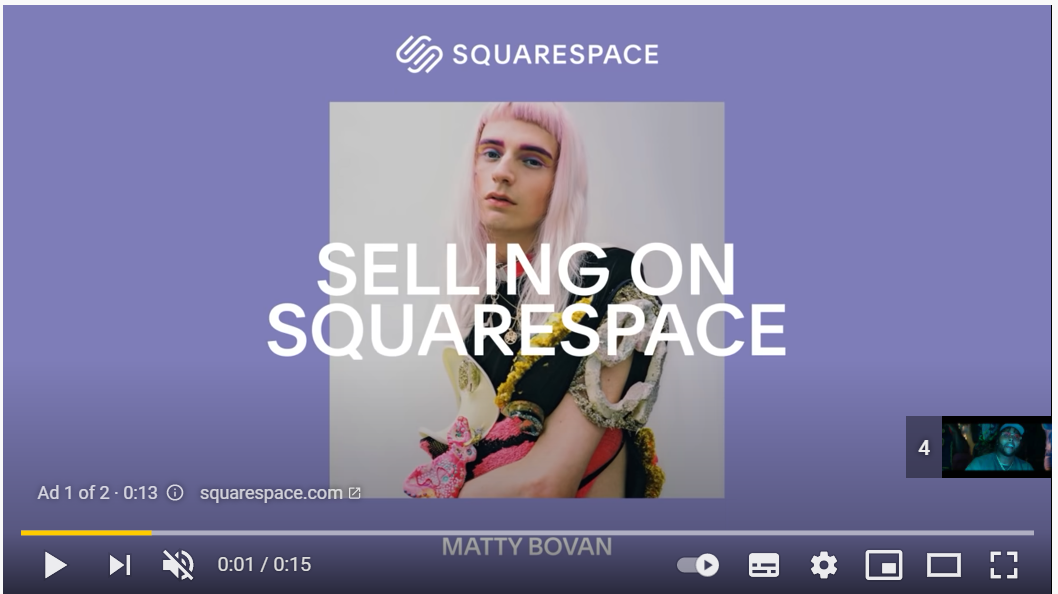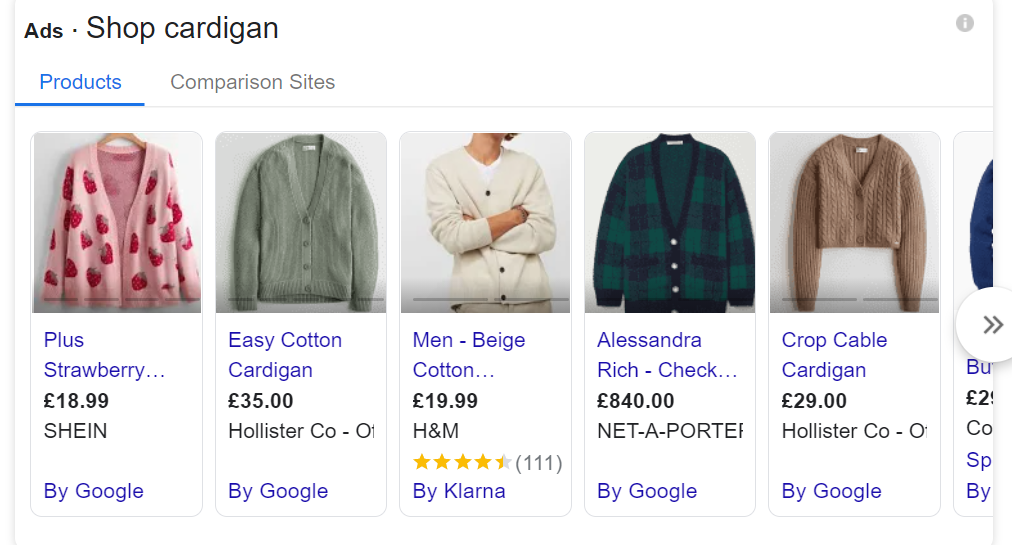Pay-Per-Click (PPC) advertising is a conversion-focused, measurable and targeted way to reach prospective customers. Through collecting user data from the PPC campaigns you run, you can gain valuable insight into your audience and buyer behaviour, enabling you to develop your PPC strategy and take advantage of emerging trends.
In this article, we’ll highlight the different types of PPC ads your business can utilise to maximise sales and conversions as well as other ways that PPC can help your business.
How PPC advertising works
PPC is a model for online marketing in which advertisers pay for the clicks they receive on their search, display and social media ads. There is a bidding system in place for advertisers to secure their ad placement in a PPC auction; if you win a bid, you’ll then pay an agreed fee each time your ad is clicked on. PPC can be highly effective as it puts your business in front of your target audience, helping to increase your visibility, Click-Through-Rate (CTR), and, consequently, sales.
There are many forms of PPC advertising and the right ads for your business will depend upon a number of factors, such as who your target audience is and what your marketing budget is. The beauty of PPC is that you can monitor your ad performance easily, allowing you to test different ad types to find a PPC strategy that works best for you.
What types of PPC ads could help your business?
There's a fantastic array of different types of PPC ads out there that your business could use to get your products and services in front of potential customers. We've gone into more detail about the most common types of PPC ads below.
- Search ads - these are the most common types of paid ads. Advertisers choose the keywords they want their ads to appear for and create ad copy designed to attract users. Search ads are valuable because you can meet users when they’re looking to buy or are actively searching for a related product or service across search engines like Google, Bing and Ecosia.

- Display ads - display ads are different to search ads in that the ads appear in front of users who are viewing web content. They are typically banner formats placed within web content on 3rd party websites, and are shown to people based on targeting criteria like contextually relevant content, interest-based targeting or specific site selection. Whilst display ads often have lower conversion rates to search ads, they are typically cheaper in terms of click prices, and will get your business in front of people who are in-market as well as those who could be persuaded to consider you.

- Remarketing ads - remarketing campaigns show ads to users who have previously visited your site, therefore indicating an interest in your products. Remarketing ads can be very profitable as they can reel back in customers who were close to converting back into the sales funnel and advertise more products to existing customers.
- Video ads - with 86% of businesses using video ads as a marketing tool, they’re becoming increasingly popular. The benefit of video ads is that they are engaging and can be effective in reaching audiences who aren’t aware of your brand. Unlike many of the other ad formats, you’re more likely to pay for video views than clicks.

- Shopping ads - shopping campaigns involve displaying ads on search engines with images of the product, its price and description, making them ideal ads for ecommerce stores to create as they provide key information.

- Paid social ads - paid social advertising involves advertising to users of social media platforms, such as Facebook or Instagram. Many paid social ads offer a variety of different types of ads so there’s a lot of creative freedom here. Moreover, you can meet an audience at the beginning of their user journey; reaching them when they’re unaware they need a certain product or service.

- Amazon advertising - as one of the world’s largest ecommerce stores, the Amazon advertising platform can seriously boost sales for ecommerce businesses. You can create: sponsored product ads to be displayed when a user searches for a related product, headline search ads for the top of a page and product display ads which work similarly to shopping ads.

We have a specialist team of paid media experts should you wish to explore any of these services in more depth.
How can PPC help your business?
Investing in your PPC strategy can have many benefits, especially for ecommerce businesses who rely on online visibility to make sales. Let’s look into some of the top ways PPC can help your business to grow...
Drive instant traffic to your site
Organic search is incredibly valuable for your long-term marketing strategy, however, it can take time to see results for your SEO efforts. On the other hand, PPC ads can drive instant traffic to your site which can be particularly helpful for newer businesses looking to get their brand out there or businesses with time limitations. With 27% of all website traffic coming from paid search, running paid ads can help businesses to maintain positive traffic levels.
Increase brand awareness and brand recognition
One of the best advantages of PPC advertising is the ability to be highly targeted with your media spend and build brand awareness within your target audience. Moreover, if a user is exposed to your brand’s online ads, they will become more familiar with your business, helping to build trust and establish a stronger identity for your business.
Increase conversions and sales
As PPC puts your brand right in front of your target audience as they’re browsing or searching online, it can instantly expand your online presence which in turn drives more traffic and hopefully conversions. If you’ve got your targeting right it can drive quality leads into the sales funnel which increases the chances of successfully converting users. And of course, if you’re an ecommerce business, you can send people straight through to your checkout to buy!
You can target specific groups
PPC ads offer multi-layered targeting options, meaning you can target specific groups based on:
- Audience (i.e. demographics, previous visitors to site, interests).
- Content (i.e. advertising on websites your customers visit or by selecting keywords you want to appear for).
- Devices (for example, targeting users on smartphones).
By targeting specific groups, you can show your brand message to users who meet your ideal customer persona and therefore are more likely to convert.
It benefits your SEO strategy
There is often confusion around whether PPC and SEO can work together. The truth is, PPC can indirectly affect SEO, but this isn’t necessarily a bad thing. In fact, PPC can benefit your SEO strategy in a number of ways, including:
- It allows you to learn more about your users as PPC collects valuable targeting information about your audience. For example, you can use your PPC data to discover the keywords your users convert better on.
- You can use PPC tools to get a better insight into keyword search volume, competitiveness and can integrate PPC data into your organic strategy.
- You can test out your keyword strategy in PPC before committing to a long-term SEO plan.
- You can improve trust with users as having both organic and paid results in the SERPs can reassure them that your site is relevant and valid.
- You can increase your online exposure - running both PPC and SEO campaigns can help you to expand your reach and get your brand noticed. Having more results on the SERP increases the chances of users landing on your site.
- You can improve your website structure and content - once you drive traffic to your site, you can use PPC data to analyse user behaviour and understand what is of interest to your prospective customers and what isn't (i.e. you can see how they navigate from one page to another and what content they spend more time viewing or skip).
Why not read our blog on how PPC affects SEO to learn more?
You can easily monitor the performance of PPC campaigns
By measuring the effectiveness of your campaigns, you can make data-driven decisions to inform your marketing strategy and improve your ROI. At the end of the day, you are in control of your advertising costs, so, if you notice an ad isn’t pulling its weight, you can stop it and focus your marketing budget on a more profitable tactic.
Advertisers can promote their ads through different types of creatives (such as text ads, banners, social posts, video, etc), measuring their performance individually, which allows businesses to make better decisions in terms of the most cost-effective creative type per media channel. As PPC allows businesses to run A/B testing and experiment with campaigns, you are constantly collecting valuable data to enable your company to evolve and are better able to capitalise on emerging trends.
You can retarget previous site visitors
Through remarketing ad campaigns, you can reach users who have clicked on your ads or visited your site but didn’t convert. Remarketing can be effective as these users have already indicated that they’re interested in your product and this is your chance to remind them of what they’re missing out on! Moreover, you can also target your existing customer base, either upselling to them or advertising products in line with their interests.
It benefits your social media strategy
Having integrated social and search campaigns gives you more cross-channel customer data which can be used to inform your paid social strategy.
You have access to ad tech and tools
There are many ad tools and technologies out there designed to help businesses with their audience segmentation, audience data mapping and allowing the businesses to target more specific audiences within their PPC campaigns to maximise their ROI.
How much does PPC advertising cost?
The cost of PPC advertising will depend on factors such as the CPC (which takes into account auction competitiveness and your quality score and the agency you decide to work with.
At Adido, we understand how long it takes to set-up, create and manage effective PPC campaigns and for this reason our PPC retainers start from £1,650 (price is dependent on size of project and complexity of business) - if you’d like to get a better indication of how much PPC advertising could cost your business, please do get in touch for a bespoke quote.
So, why is PPC advertising a great way to help your business thrive?
In short, PPC can deliver you instant traffic from which you can make more informed business decisions on the products or services you’d like to push, the best platforms to focus your advertising efforts on, a better understanding of buyer behaviour and a valuable insight into market trends you can capitalise on.
PPC offers businesses an abundance of data; you’ll never have to base an ad off of guesswork again! You’ll be able to closely monitor changes in your industry and how the market is responding to your products, approaches and messages.
Essentially, PPC helps you to scale your business by reaching the 27% of users who are clicking on the top search results, increasing sales through raising brand awareness across a myriad of sites and platforms, and allowing you to measure your ROI which you can’t do (easily) with many traditional marketing methods.
Looking for a PPC agency?
We are Adido, a PPC agency in Bournemouth offering PPC services in Dorset and beyond. We help commercially-focussed businesses to evolve and get the most out of their paid advertising campaigns. Take a look at the PPC services we offer or contact us today to find out how our PPC team can help your business to evolve.





